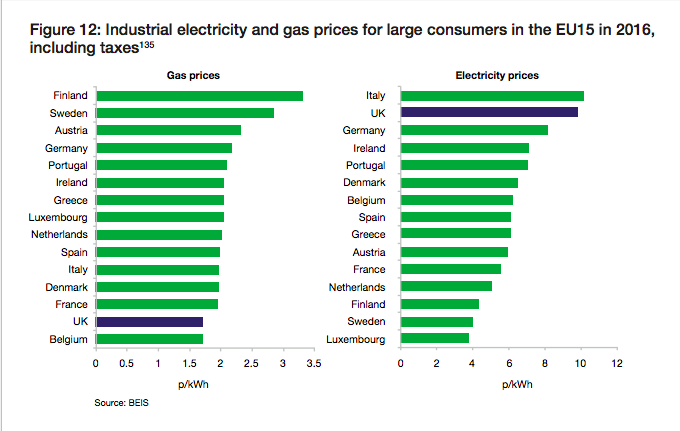
The government’s clean growth plan outlines its intention to task industry to deliver energy efficiency improvements of at least 20 per cent by 2030.
The paper says government will create a ‘simpler, more ambitious and long-term policy and regulatory framework’ to enable that ambition, through it states a final decision on any aspirational target will not be taken until 2018.
The strategy outlines plans for an industrial energy efficiency scheme, as mooted in the Tory manifesto, to help large companies install measures to cut consumption and bills.
The document illustrates that UK industrial firms pay the second highest electricity prices in Europe, with policy costs driving those bills upwards.

Meanwhile, it highlights that of the 5.5 million businesses in the UK, the majority of energy use comes from around 7,000 large companies.
The government believes that by incentivising large firms to cut consumption, UK industry can become more competitive while driving down overall energy use and emissions.
The strategy sets out a ten point, high-level plan to unlock business energy efficiency, starting with a commitment to consult next year on how to support UK firms to improve energy productivity by at least 20 per cent by 2030.
It commits to assess and potentially reform Esos, some funding to improve use of industrial heat and a consultation on a new, streamlined energy and carbon reporting framework.
For smaller firms, there appeared to be little other than a commitment to ‘explore with stakeholders how we can improve the provision of information and advice to SMEs to encourage the uptake of energy efficiency technologies’.
See the clean growth plan, which outlines the direction of travel of UK energy policy across energy, heat and transport, here.
Related stories:
May moots industrial energy efficiency scheme
Energy efficiency: Bring public sector into Esos and hold directors to account
UK firms paying highest power prices in Europe
Government ‘should incentivise energy efficiency over renewables’
Policymakers must unlock economic benefits of storage, flexibility and efficiency
Energy Institute: Policymakers should prioritise ‘poor child’ energy efficiency
Energy Institute urges retrofits and equipment upgrades to make quickest efficiency gains
Engineers tell government to pay for energy efficiency
Government should subsidise energy efficiency over renewables and give Esos teeth
Esos and the slow death of energy management
M&S boss: There is more low hanging energy efficiency fruit than ever
Ofgem: Energy flexibility will become more valuable than energy efficiency
Renewable heat subsidy schemes ‘wasting money’ by ruling out waste heat
Eon calls for energy efficiency push
National Grid boss: future of energy is demand not supply
Click here to see if you qualify for a free subscription to the print magazine, or to renew.
Follow us at @EnergystMedia. For regular bulletins, sign up for the free newsletter.




The UK is poised to create a low-carbon, competitive economy, and combined heat and power, demand response and energy efficiency all have important roles to play; With commitments to deliver the smart energy plan and new industrial energy efficiency investments power, alongside a potential for £6 billion in energy savings, businesses and investors will have increased confidence to invest in new measures to help improve their competitiveness and meet our carbon goals.
Promoting energy efficiency to SMEs is only part of the solution. Onsite renewable and low carbon energy generation can deliver more substantial energy cost and carbon savings in addition to providing energy resilience and an effective hedge against volatile and increasing energy costs.